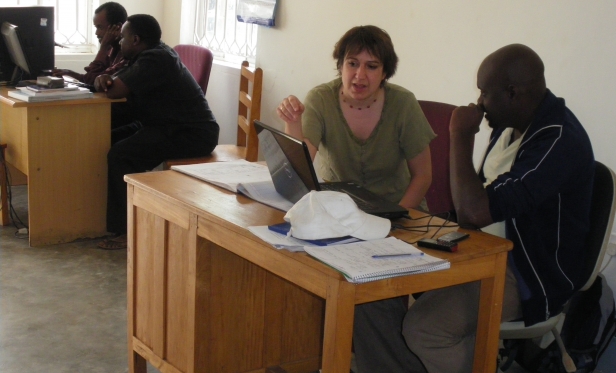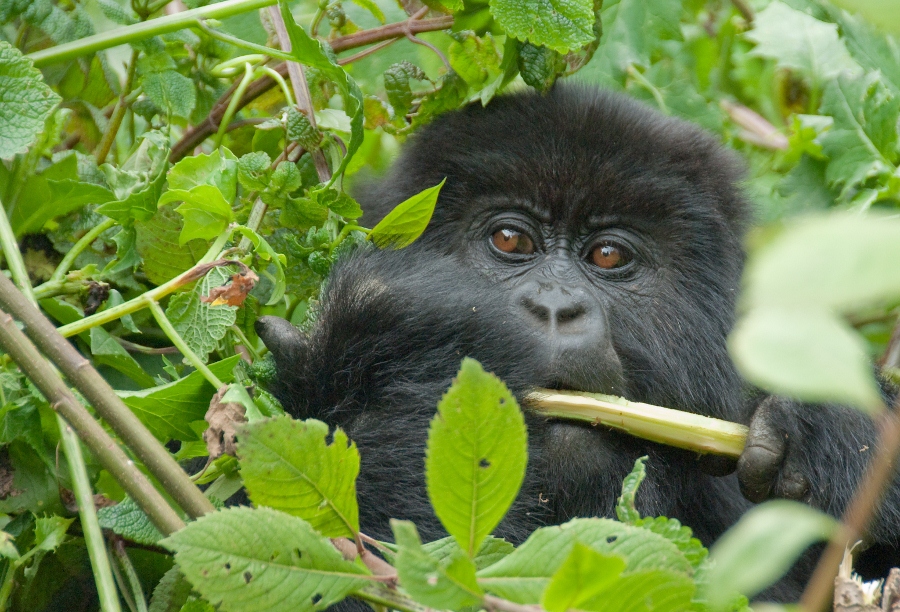Murmurings from Mubende

Laura (MAAT)
Rural Healthcare Foundation (RHCF), Uganda
So, here I am nearing the end of my final week in Uganda. Right now I'm at a hotel on the outskirts of Kampala where I am attending a strategic planning meeting with the RHCF team and tying up the loose ends before my departure. Rural Healthcare Foundation (RHCF), Uganda
It felt odd bidding a final farewell to Mubende last week, it’s a fairly non descript town really, but I’ve become fond of it. As with the majority of African towns, it consits of hap hazard rows of shops, often with homemade signs and goods spilling out onto the street. The locals come across as industrious folk, busy with their day and the place feels like its slowly making progress, person by person. It would be good to return one day to find the people more prosperous and the streets better cared for, but I hope it never loses its character.
I have made a couple more visits out of the office since last writing, one of which was to a school which already had a toilet block built by RHCF and now they were going to educate the children on how to make a tippy tap.
A tippy tap is designed for use by the same people who would be utilising the wells and is a simple contraption of a plastic jerry can suspended with string from a couple of wooden polls in the ground. It enables regular hand washing and is an essential tool in the progression of sanitation.
On our arrival, seats were found for us under a large tree in the grounds and we were each introduced to the 50 or so children who clapped for us in turn. When it came to me, the teacher got them to say my name, it was great hearing them all attempting to say “oooss-bon” and dare I say very cute.
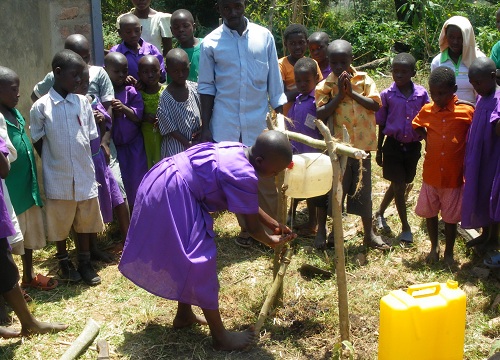
A member of the RHCF staff then built and demonstrated the tap with the help of the children. The idea is not just to have taps at the school, but also that the children will go home and show their parents how to make one. In about a month’s time, RHCF will make house visits to see how well the tap making has gone and to help the parents out if they need it. Teaching like this works very well and word of mouth soon spreads around the villagers.
My final visit was to a local children’s home where RHCF had built a well serving not just the home but also the local community. Around half of the 25 children there live with HIV and their families are either too sick or elderly to care for them, but visits are made whenever possible to enable them to stay in touch with loved ones.
The home was out in the beautiful countryside, amongst the hills and fields, a neat new tin roofed building sitting in the middle of its own farm land. Compared to the homes these children come from, I could see this was a very good standard and they all seemed happy and well cared for, a big family of sorts with their Mamas and an old gentleman neighbour who I could see was a fond grandfather figure.
As we arrived, the younger ones who were home from school, ran up to the car to greet us. I should point out that all the young children I meet here in Uganda are in the very early stages of learning English, so our communication comes mainly in the form of smiles and waves. After a look around the farm and the obligatory well inspection, we all enjoyed sitting in the shade sharing a huge jackfruit together. A jackfruit is a large green fruit about twice the size of a rugby ball covered all over in little bumps, it turns out that it also has a glue resin that gets all over your fingers, but the fruit is very tasty when you finally get to it.
Back at the office the electricity has been a little more frequent of late so we have been able to finish what needed to be done and everyone is delighted with the progress we have made.
My weekend was spent visiting Queen Elizabeth National Park, out in the west of the country, a different tribal region with ladies in wrap dresses and children with a great line in wooden bicycles. We stayed at a rustic, well equipped lodge on the shores of Lake George where the hippos could be heard calling to each other in the evening with a throaty chuckle, before coming out to graze. I was glad to have an escort to my cottage when heading to bed, a hippo is the very last animal you want to stumble across in the dark.
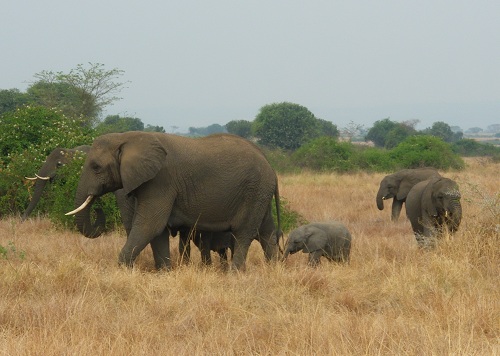 The following day I enjoyed a wonderful game drive in the company of my highly knowledgeable guide who was able to identify even the smallest brown bird. The highlight for me was being held up by a large family of elephants blocking the road, I was in heaven! We must have been a good hour watching the heard which had several young ones and a tiny 2 week old baby with its mum. This is what I had come for, just us and the elephants watching them interact with one another and pulling their breakfast from the bushes with wandering trunks.
The following day I enjoyed a wonderful game drive in the company of my highly knowledgeable guide who was able to identify even the smallest brown bird. The highlight for me was being held up by a large family of elephants blocking the road, I was in heaven! We must have been a good hour watching the heard which had several young ones and a tiny 2 week old baby with its mum. This is what I had come for, just us and the elephants watching them interact with one another and pulling their breakfast from the bushes with wandering trunks. The baby was of course particularly good entertainment, suckling its mum before exploring a little and returning to the safety of her company. Eventually, they crossed the road in front of us and at one point a teenager, protective of the baby, made a mock charge at us which meant a swift bit of backing for the guide. I felt safe at all times though, he never stopped watching for the signs of danger and his total respect for them was evident.
Later in the afternoon I took a gentle boat trip down the Kazinga Channel that connects Lakes Edward & George. The boat made a perfect viewing platform and I saw, tonnes (literally!) of hippos, crocodiles hiding in the shallows, monitor lizards lazing on rocks, more elephants, buffalos and loads of different birds including the majestic fish eagles. It was a real first for me and very special thing to do.
Finally the next morning I went on a forest walk, this time I’m glad to say, on a mercifully flattish path. It made for a lovely morning amongst the trees with the huge thunderstorm from the previous night making everything smell fresh. Our guide pointed out the various plants and bugs and although we didn’t see any chimps (which was supposed to have been the main attraction) we did see the beautiful black and white colobus monkeys, as well as the red tailed and gray varieties which was fantastic, particularly when they could be seen leaping from tree to tree. A lovely end to my trip.
So that’s about it. It has been a real privilege being both a member of the RHCF team on my weekdays, sampling a little of everyday live here in Uganda and then being a tourist at weekends seeing the more traditional sights that the country has to offer.
I
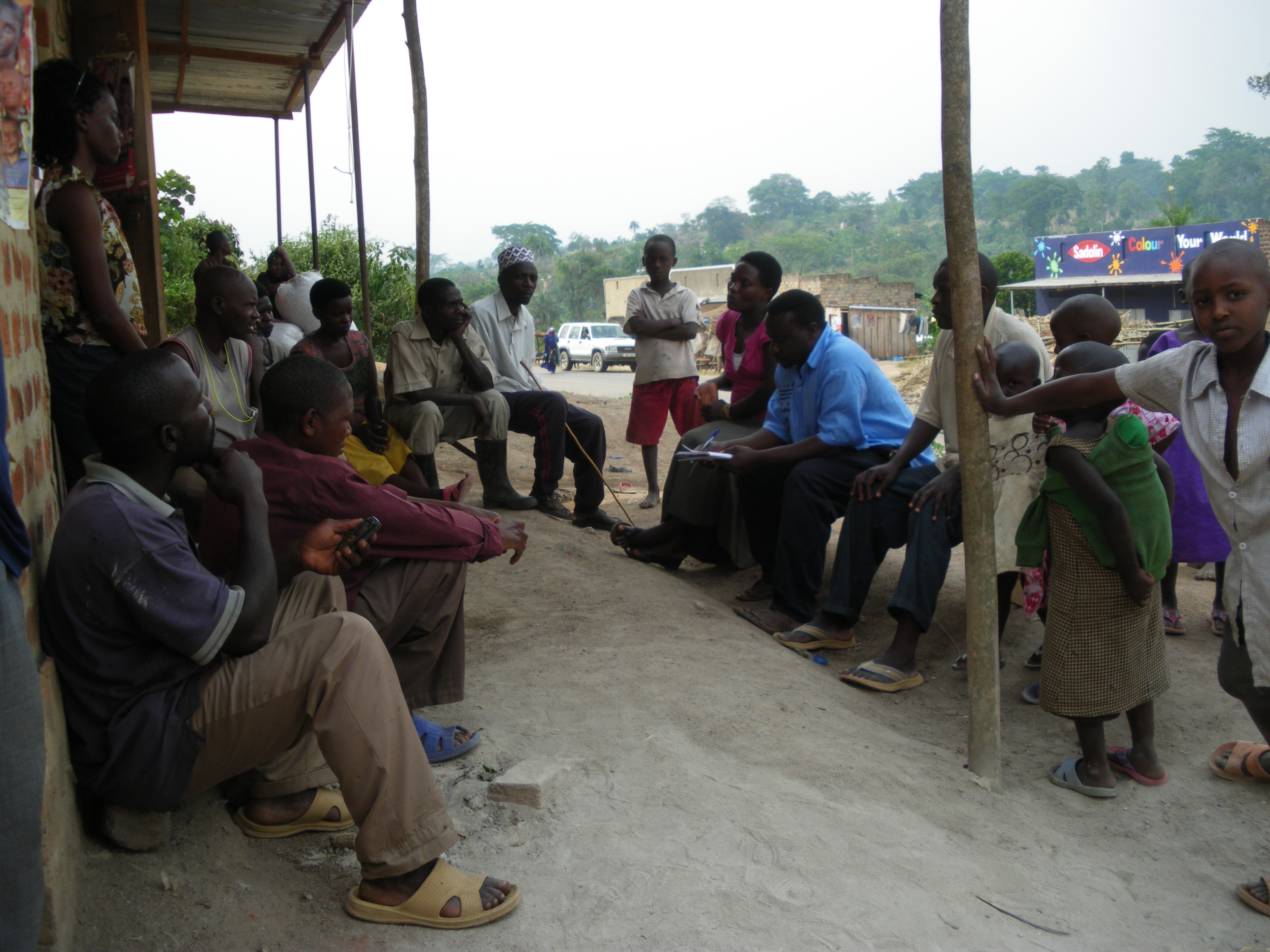 will miss the exotic bird calls in the mornings and of course the warmth and sunshine, although the rains have arrived this week to acclimatise me a little for my return to the UK. I will also miss the gentle, dignified people of Uganda who have made me feel so welcome in their country. From my colleagues at RHCF who I have become very fond of over the past six weeks, to the strangers in the street, it is not an exaggeration to say that I have found the vast majority of people here to be open and friendly.
will miss the exotic bird calls in the mornings and of course the warmth and sunshine, although the rains have arrived this week to acclimatise me a little for my return to the UK. I will also miss the gentle, dignified people of Uganda who have made me feel so welcome in their country. From my colleagues at RHCF who I have become very fond of over the past six weeks, to the strangers in the street, it is not an exaggeration to say that I have found the vast majority of people here to be open and friendly. In comparison, I am not looking forward to dealing with the officious staff and suspicious locals that the UK has to offer. I have got very used to being able to stop and talk to pretty much anyone and receive a cheerful, helpful response, sometimes even a hand shake, whether they be a gun wheedling security guard or a hotel cleaner.
I have had a wonderful experience here and would recommend Uganda to anyone who wants to visit a vibrant, beautiful country where a foreign face is greeted with a welcoming smile.
Gorilla Gorilla
Stayed my weekend at Banana Village, a little purpose built resort with well equipped bandas (huts) amongst lovely gardens with their own troupe of vervet monkeys causing mischief wherever they went.
On the Saturday I headed out to Lake Victoria to try my hand at bird watching and after a long walk, the road finally ended at the carpark of a new, yet to open hotel. Sitting at the barrier was the security guard who welcomed me in, showed me to the gardens overlooking the lake and found me a chair. It says something special about the Ugandan people that this was not a surprise, nor was it any real shock as odd people joined me for a chat during the day and one of them turned up with lunch. We shared beans and ugali (clumpy maize porridge, quite nice actually) and she would only accept a small donation for her generosity. Later, she found me a mat so that I could relax at the waters edge and sat with me for a while identifying the majority of the birds as ducks.
I very much enjoyed my day bird watching, not something I’ve ever done for that long before, but here, there are so many different types and it was relaxing furrowing through my bird book attempting to match the different species in the pictures to the live subjects, (none of them were ducks). I did foolishly allow myself to get sunburnt on this day, I had worn long sleeves and sat in the shade with sunblock on, but this was the first time I’ve ever been burnt on my hands!
The following week at work, we continued to make good progress in between the power cuts. My colleague calls it guerrilla working, basically doing what you can when you can and he tells me you have to be pretty good at it here in Uganda with the various obstacles that life throws up. We didn’t get any field trips in that week due to the lack of transport, my presence appears to have cursed both of the RHCF vehicles in one way or another, but guerrilla tactics prevail and a vehicle is always found in time for when we really need one, even if it has to be borrowed from a friend in Kampala.
That weekend I was dropped off at Entebbe for the start of my gorilla trekking weekend and I won’t bore you with the logistics and travelling companions that followed. Suffice to say, we all got on very well nattering away the 8 hour journey to Kisoro the following day. We stayed at the historic Travellers Rest used as a second home by the late Dian Fossey and other famous naturalists. It was a nice hotel with real character and sitting in the gardens I treated myself to a G&T as we watched dusk fall over the volcanoes in the distance.
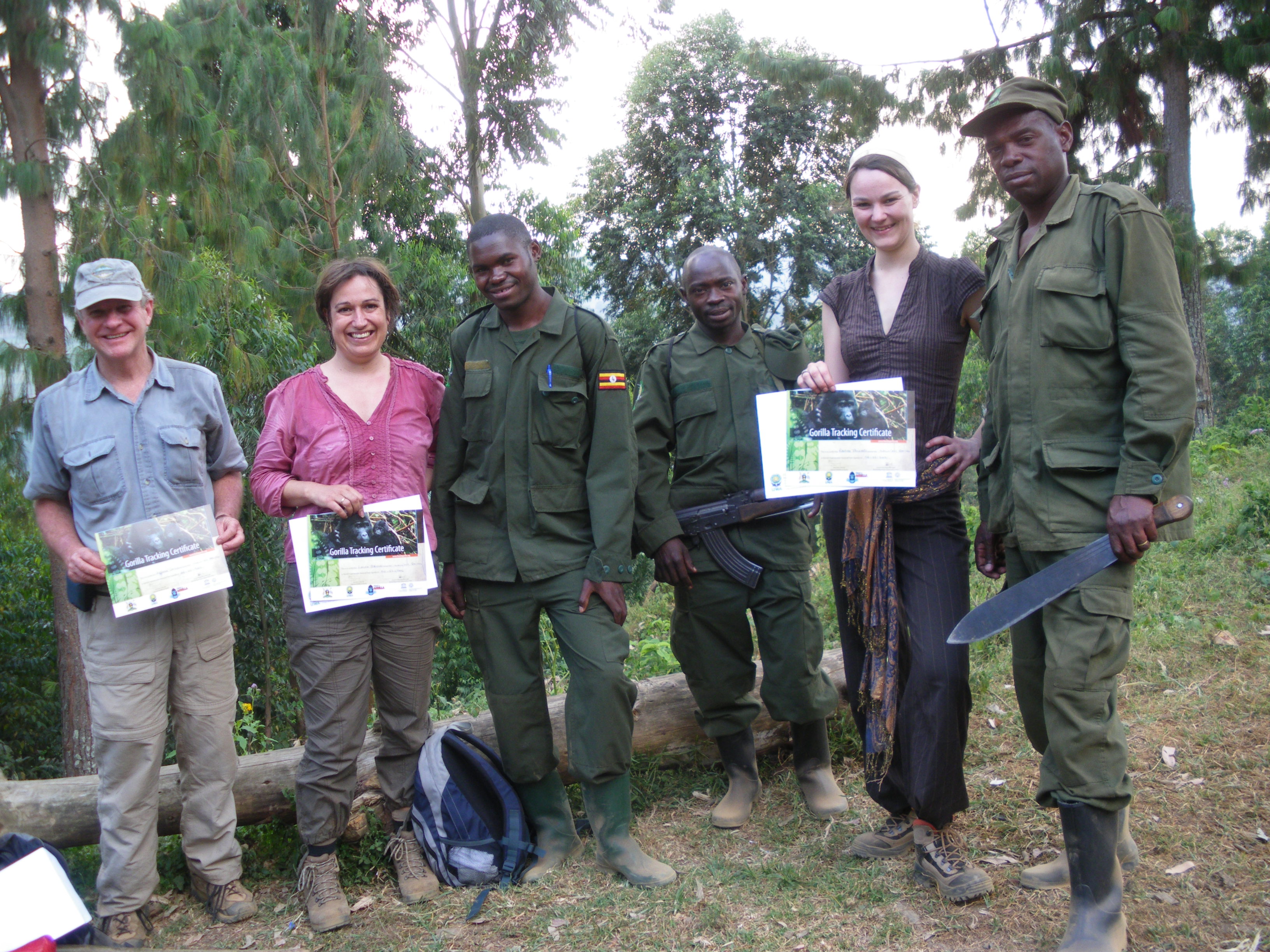
The next morning we headed out into the darkness and watched dawn break as we drove up to Bwindi. After having permits and passports checked at the start point, I headed out into the fresh morning air with a group of just two other trekkers, our guide and a man with a gun. First, we had to be transported to another start point and for this we took the scouts truck and had a laugh sitting in the back bouncing about on our bums much to the amusement of the locals.
Eventually, we reached our starting point and we were off, dragging ourselves up a 2km hill before we had even clapped eyes on a group of trees and then navigating our way along the narrow, spongy, rocky, rooty, pathways of the forest itself, I was eternally glad for the walking sticks they gave us.
After about a three hour trek, news came through from the scouts that we were close to the gorilla group, so after a final brief, we headed into the thick forest away from the path. Then, gorilla, just like that, a big fuzzy black fur ball, half way up a tree munching on leaves. We followed the scout further into the undergrowth with him hacking a way through with his machete and there, sitting surrounded by his meal was the silverback, with his huge head, thoughtful face and beautiful thick black fur.
He did everything at a sedate pace, pulling at leaves and posting them into his mouth, his strength was self evident as he gently snapped off the branches that our guides had to hack at. Occasionally he acknowledged our presence by stopping chewing and looking at us with his keen brown eyes, but for the most part he didn’t seem to care about us being there. As he got up and disappeared amongst the fauna, he remained conspicuous as he moved about, ploughing through the undergrowth and yanking huge vines off the trees into his hiding place.
There were plenty of his family to see too and we spent much of our time watching a couple of the younger ones who entertained us by climbing up and falling off of branches. They were a little more curious than their father was, stopping what they were doing from time to time to stare back at us, but for the most part they too got on with the business of exploring their forest world. It was a true privilege to see these creatures acting so naturally in the place where they belong, there are currently just over 700 mountain gorillas left recorded in the wild.
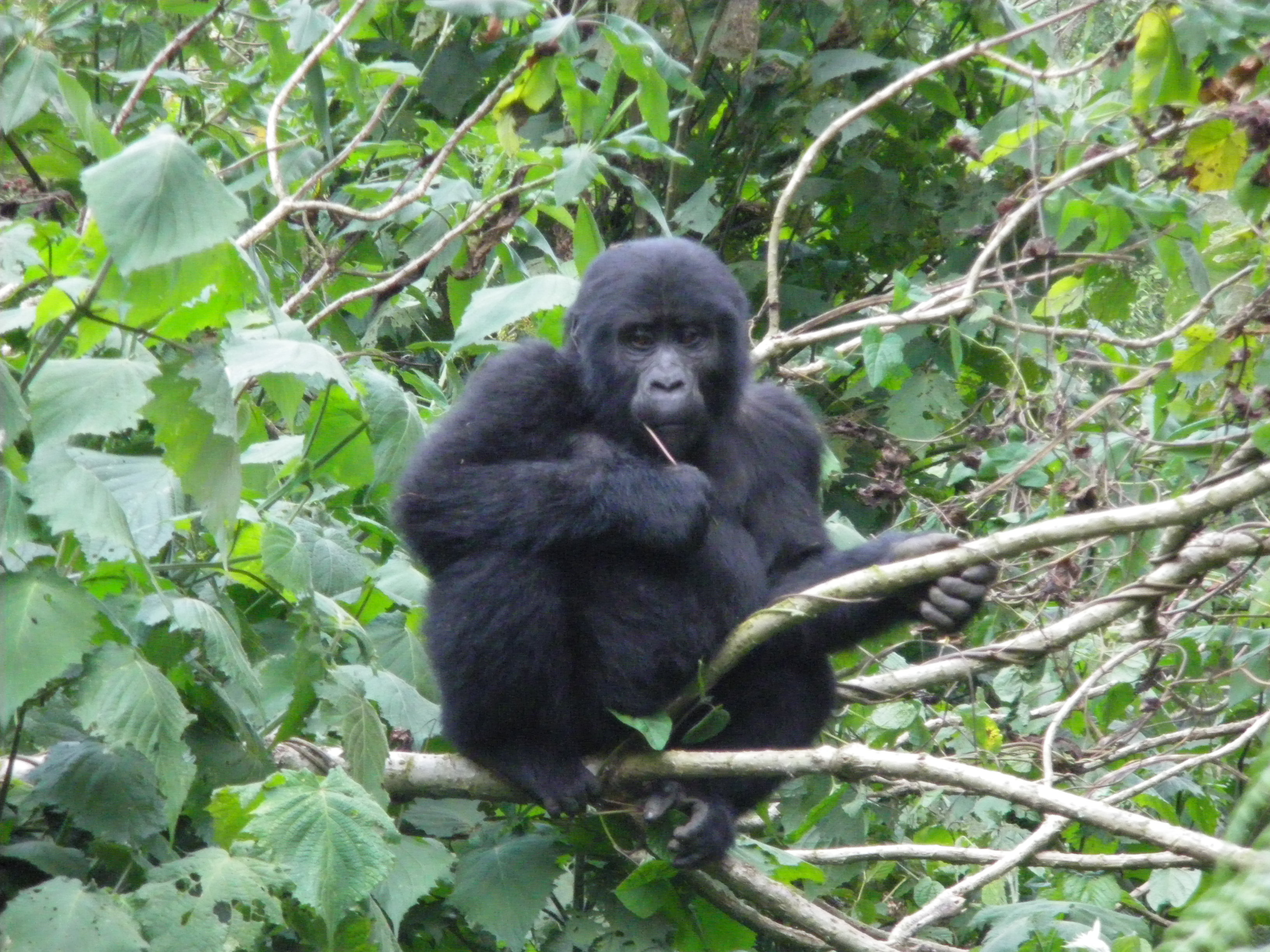 All too soon we had our five minute warning and we were snapping our last photos and after the long trek home I was pretty much on my knees. I know we all say that about a day out Christmas shopping, but I really was almost on my knees and only made it back without falling flat on my face thanks to the lovely guide who looked after me all the way. When we finally got to the bottom of the hill we were all absolutely elated, and I for one felt a huge sense achievement, some things in life are well worth the effort.
All too soon we had our five minute warning and we were snapping our last photos and after the long trek home I was pretty much on my knees. I know we all say that about a day out Christmas shopping, but I really was almost on my knees and only made it back without falling flat on my face thanks to the lovely guide who looked after me all the way. When we finally got to the bottom of the hill we were all absolutely elated, and I for one felt a huge sense achievement, some things in life are well worth the effort. Back at the office the next week the electricity continued to be a major problem sometimes off all day but we made the best of it as usual. We have achieved much of what we set out to do with the new accounts systems now and everyone is pleased with the result which is great.
One power famished afternoon we headed out for another field trip, this time into the countryside south out of Mubende out in amongst the fields of corn, sweet potatoes and of course bananas. Goodness knows how our driver finds his way about as there are no sign posts anywhere and we drove down several very narrow tracks before pulling up at a small farm with a familiar RHCF sign out the front.
This was a farmer who has been trained in the most efficient techniques to ensure he can get the best from his crops. He is now training others to increase their yields and so it goes. We stopped here for a chat, (the chats are all in Luganda of course so I never know what is actually being said) and sat under a tree munching on sugar cane for which I’m gradually developing the gnawing technique.
They came across as a cheerful family, with the children sitting in the shade helping to prepare lunch, an older woman sitting under a tree weaving a basket and the farmer proudly showing us his cow. The cow was a “Send A Cow” cow if you have heard of that charity, she already had one calf in the next stall ready to be given to another farmer and was pregnant with her second. She certainly looked very well cared for and I was told she has made a huge difference to the family.
As we sat in the shade, the mother came out to greet us accompanied by the younger ones and the smallest little girl came over cradling a huge (for her) papaya in her arms and knelt down in front of me with her gift. This time I was ready with my Luganda greeting and thank you, it feels extremely odd being treated as guest of honour everywhere I go with RHCF and I feel very undeserving of all the attention!
We headed back after that, stopping off to see another well made from a natural spring, with an underground cover for several metres so that the water doest get contaminated, clever stuff. All these visits are giving me a real insight into the varied work that RHCF does, but it all has the same aim, to produce healthy people, whether by providing clean drinking water, or educating them about sanitation and farming techniques.
Off on another field trip to a school tomorrow and lake Victoria for the weekend, coming up is a strategic planning meeting in Kampala and a final trip to Queen Elizabeth National Park.
Fi
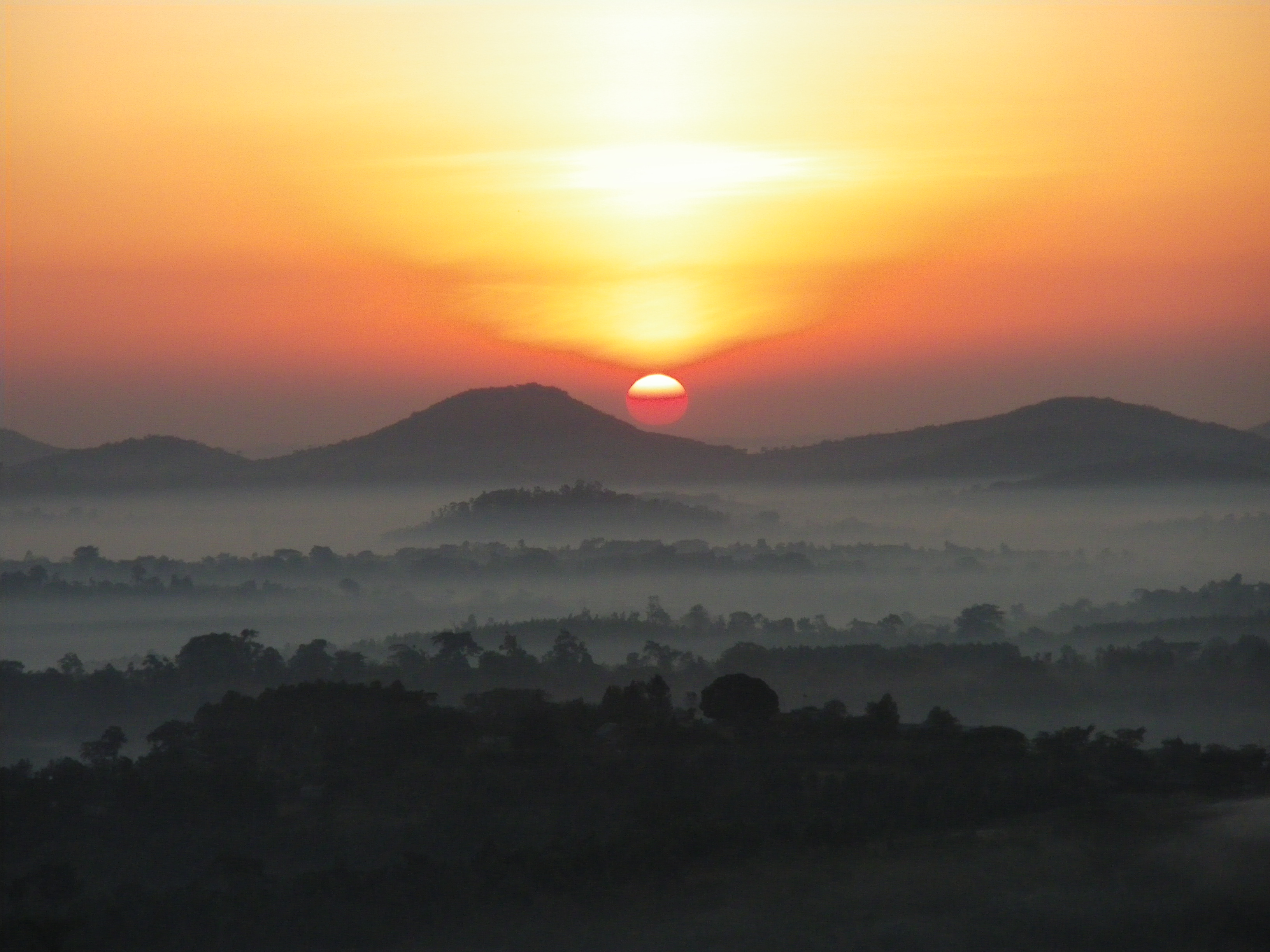 rst Impressions and starting work
rst Impressions and starting workFirst of all, Uganda is beautiful. On my first morning in Entebbe having arrived in the dark the previous evening, I was woken by an exotic dawn chorus coming from the lush gardens around my B&B. Driving out of Entebbe with my new host, there were trees everywhere and the country felt green and fresh despite the heat. After picking up a couple more colleagues along the way, we headed out to the Rural Healthcare Foundation office in Mubende, about a 3 hour drive west of Kampala.
The countryside opened out into rolling hills festooned with trees and valleys covered in papyrus. There is wonderful birdlife all over here with eagles and hawks soaring overhead soon becoming a common sight. There are little tin roofed houses dotted about all over and we also drove through various small towns along the way stopping in one to buy some corn on the cob from one of the many sellers that surround the car when you slow down. The road here is pretty well tarmaced for the majority of our journey, but there are odd sections where it turns to red dust and craters.
One of the most common sights are bananas or rather matoke, the green version that is cooked and eaten in abundance here. The trees are everywhere and the huge bunches are stacked up at the market places. I can’t imagine how hard it must be for the men pushing their bicycles up and down hills laden with up to 8 huge bunches to sell.
Mubende is a fairly large town but it’s hard to tell because the houses are well spread out over the hills and it never feels particularly urban. There is usually the smell of smoke in the air, as most of the locals burn their never ending supply of wood (trees grow quickly here in the red, iron rich soil), to sell as charcoal. My hotel is on the hill overlooking the town, with beautiful views across the distant countryside, it’s been a welcoming place with friendly, helpful staff and a fresh breeze blows up the hill in the early morning.
The RHCF offices are in a house on the other side of town which is split into a residential area for staff staying here during the week and the single room office. Driving up the bumpy track we pass houses with goats, chickens and the odd pig mingling happily with the local children outside at play. I am stared at just about everywhere I go, they clearly don’t see many white faces here and they appear slightly intrigued by my being in town.
I am very much enjoying working with the RHCF accountant, he is a quick learner and we are making excellent progress on our objectives, despite the power being off about 50% of the time. I have quickly learned to keep my laptop charged up, thankfully the hotel has a generator so I can usually guarantee a couple of hours battery life per day.
On the way back we visited the village on the other side of the road who have also requested a well. This one will be in the grounds of the local school, which consists of a row of small windowless buildings and a couple of mud and straw huts in the otherwise empty playground. A well will be a definite step up for these people and as we drive away there is a lady washing her laundry in the stream, I hope she gets her well soon.
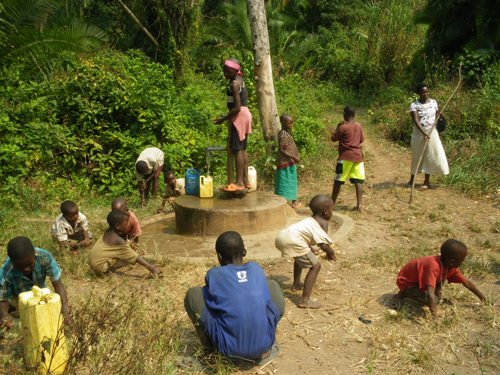
Spent my weekend in Kampala staying at nice little hotel near the top of one of the seven hills with an excellent grill restaurant in front. Kampala is hot and busy, you have to watch where you walk on the uneven pavements which sometimes force you to walk into the road dodging the traffic. I’m not much of a city person to be honest, but Id wanted to spend one weekend here to see the place and I set out on Saturday in the direction of the craft markets. I did have a day planned after that, but ended up spending most of my day browsing the stalls trying to tell gifts from tat, not easy at any time but I’m still happy with what I bought.
My weekend wanderings also took me past the independence memorial and Sheraton Gardens, a small oasis of green which could be a London park with its clipped lawn and bust of George V if it wasn’t for the exotic trees and vulture like marabou storks that patrol the gardens looking menacing.
Headed out to Mubende again on the Monday morning and have fitted in a productive week amongst the power cuts. We made another trip out, this time to a local village further into the countryside to visit peoples’ houses and access the work that needs doing in terms of hygiene education. These people also had a well, this time at the bottom of a tree lined valley where the water table was most assessable. We found it in use by the local children collecting water and we stopped to talk to them about the importance of keeping it clean at which point they all set about tidying the place up.
Next we moved on to a house to house survey. People here live a very simple life of subsistence farming on their plot of land and if the children can walk to 4 miles to the local school they will get some sort of an education too. The houses are more basic than those in town, made of mud and straw and consisting of two or three separate buildings with the pit latrine a little distance from the house. It was these that were being assessed for cleanliness and while some were kept tidy, others clearly needed a chat with a member of RHCF staff about the importance of hygiene. The plan would be to start a system of educating representatives in the community, (women are best as they are responsible for childcare) and pass on knowledge that way. RHCF have various simple, well constructed plans for helping people such as this.
Off to Entebbe this weekend first staying at a place close to the lake for a spot of bird watching and then onto Entebbe again so that I can visit the botanical gardens hoping to spot a few monkeys there, must remember to bring my binoculars!
Read Blog
